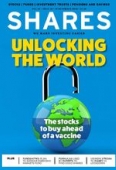Archived article
Please note that tax, investment, pension and ISA rules can change and the information and any views contained in this article may now be inaccurate.
Let’s hope ESG doesn’t become a meaningless term

In an age where ESG (environmental, social and governance) factors are becoming more important to investors, it can feel like funds and companies are clamouring to paint themselves in these colours for the cachet it involves.
The danger is that the term is diluted to the point of meaninglessness. For example, tobacco manufacturer Imperial Brands (IMB) is in the process of developing a new ESG Steering Committee and yet its main product has a major negative impact on global health.
You don’t need to make a sweeping moral judgement on the sale of cigarettes to see that it is important to distinguish between businesses which are reaching for a label and those which are genuinely having a positive impact on society.
We should be able to make an informed choice about how to align our principles with our investing and treating ESG as a box to tick or trying to paint the activities of a business in an unrealistically favourable light does nothing to help.
A recently listed vehicle where it is much easier to see the good which is being done is Home REIT (HOME).
Floated in October, the company recently confirmed it had attained real estate investment trust (REIT) status and announced the deployment of a further £42 million of the £250 million raised
at IPO (initial public offering), taking the total allocated to date above £50 million.
Against the backdrop of a housing crisis in the UK, this money is being invested in properties across the country which will provide accommodation for a variety of vulnerable groups including women escaping domestic violence and people facing homelessness due to poverty.
This isn’t a purely altruistic exercise – the trust is looking to generate a total return of 7.5% a year for investors as it claims inflation-linked rent payments from local authorities, themselves backed by the Department of Work and Pensions.
However, there is an element of ‘win-win’ in this scenario as the accommodation it offers is cheaper than other temporary alternatives like hotels and bed and breakfasts.
Over time, the market and regulators are likely to get better at making distinctions between genuinely ethical investments and those which are merely paying lip service to the concept of social and environmental responsibility.
At the beginning of November 2020, the Competition & Markets Authority announced a crackdown on so-called green-washing or exaggerating the positive environmental impact of a product or service.
The focus is likely to fall on areas like the fashion industry, travel and transport, and consumer goods like food, beverages as well as beauty and hygiene products. There is the threat of enforcement action if it determines consumers are being misled.
Important information:
These articles are provided by Shares magazine which is published by AJ Bell Media, a part of AJ Bell. Shares is not written by AJ Bell.
Shares is provided for your general information and use and is not a personal recommendation to invest. It is not intended to be relied upon by you in making or not making any investment decisions. The investments referred to in these articles will not be suitable for all investors. If in doubt please seek appropriate independent financial advice.
Investors acting on the information in these articles do so at their own risk and AJ Bell Media and its staff do not accept liability for losses suffered by investors as a result of their investment decisions.

 magazine
magazine








